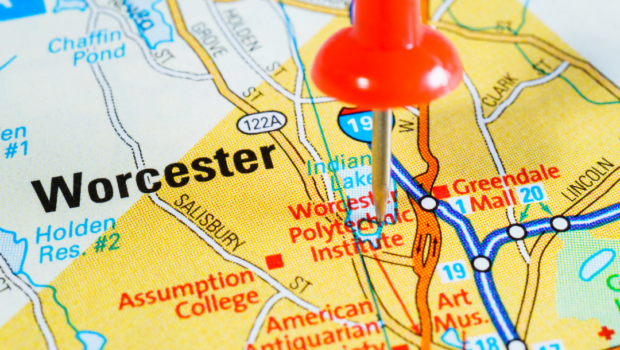by Caitlin Lubelczyk, Vice President of Marketing and Communications, Worcester Regional Chamber of Commerce
For those of us who were born here, raised here, or have relocated here, we know that Worcester is a city with a rich history and a diverse community. Amidst its historic streets and bustling neighborhoods, small businesses stand as pillars of economic resilience and local charm. However, these businesses are facing a host of challenges that threaten their survival and growth. Worcester’s struggles mirror those of many other cities coping with economic uncertainties, regulatory complexities, and shifting consumer landscapes. At the Worcester Regional Chamber of Commerce, more than 80% of our over 2,300 members are small business owners with 20 or fewer employees, and these issues are always top-of-mind for us as we work individually with business owners every day and advocate for the business community at large. What are some of the challenges small businesses encounter in Worcester and how are similar cities across the nation supporting their local economies?
First and foremost, the pandemic.
The recent global pandemic cast a harsh spotlight on the vulnerability of small businesses in Worcester. Lockdowns, supply chain disruptions, and shifting consumer behavior created a perfect storm, forcing many businesses to close their doors permanently. One of the lasting aftereffects of the pandemic has been the shift towards remote work, which has removed office populations from downtown areas in cities around the country, resulting in a negative impact on retail and small businesses that rely on pedestrian foot traffic. On top of this, business owners are now dealing with fluctuating demand, and increased operational costs.
The hospitality, retail, and entertainment sectors, heavily reliant on in-person interactions, were particularly hard hit, resulting in job losses and a diminished economic landscape. Additionally, supply chain disruptions and increased costs added further pressure, making it challenging for businesses to maintain profitability.
Regulatory Complexities:
Navigating the maze of regulations poses a formidable challenge for Worcester’s small businesses. From zoning laws to licensing requirements and complicated tax codes, the regulatory landscape is often overwhelming for businesses with limited resources. Small business owners find themselves spending significant time and resources on administrative tasks, diverting their attention from core operations.
Streamlining and simplifying regulatory processes are crucial for fostering a more favorable environment for small businesses. Advocacy for regulatory reforms is gaining momentum, with business associations and chambers of commerce urging local governments to revisit and revise cumbersome regulations. The Worcester Regional Chamber of Commerce for example has continued to advocate for our businesses who continue to be hit with higher tax rates. Over the past seven years, the city council has continued to vote to widen the gap between residents and businesses shifting more of the tax burden onto the business community. Last year, for the first time ever, the council voted for the lowest residential tax rate possible. Our city now has the seventh-highest commercial tax rate in Massachusetts, making it increasingly challenging to do business in Worcester.
The dual tax rate – different rates for residential and commercial properties – was enacted in Worcester in 1984 and at that time, 35% of the tax base came from our commercial/industrial sectors. Now, 40 years later, only 20% of the tax revenue comes from the commercial/industrial sectors, meaning our businesses are leaving for neighboring communities with fairer tax rates. With fewer commercial properties on the tax rolls and taxes increasing each year, a smaller number of property owners pay more. Taxes often are passed onto tenants through rent, which means small businesses disproportionately bear the burden.
Shifting Consumer Dynamics:
The rise of online retail giants has transformed consumer behavior, challenging the traditional brick-and-mortar model. Worcester’s small businesses are grappling with the need to adapt to the digital age, establish an online presence, and compete with e-commerce trends. For retail businesses rooted in the local community, this shift poses a threat to their business model.
Similarly, in cities across the nation, small businesses are confronted with the dilemma of embracing digital transformation or risk falling behind. E-commerce platforms offer convenience and a global reach, leaving local businesses with the challenge of finding their place in an increasingly digital marketplace. Many of our local retailers have adjusted by offering curbside pickup, online ordering, and partnering with businesses like Uber Eats or Grub Hub.
Community Dynamics:
Community engagement and support are critical lifelines for small businesses. As we’ve read in recent articles, our business owners need our support. Worcester’s residents can contribute significantly by choosing to support local enterprises, fostering a sense of community and shared responsibility. Initiatives such as “Shop Local” campaigns and community events have been popular, providing a much-needed boost to struggling businesses, but our small businesses need more than that to keep afloat. This isn’t just the responsibility of local residents and individuals, there are opportunities in our community for businesses to support other businesses as well. Worcester is experiencing significant growth, and we all play a very important role in the success of the city’s economy. We need to look at it like we’re “growing the pie” …more housing equals more density and foot traffic, which leads to more spending power, which leads to more businesses, and more jobs.
Collaboration for Solutions:
Addressing the challenges faced by small businesses requires collaborative efforts from all stakeholders. Local government, business associations, and anchor institutions can play a pivotal role in creating an environment conducive to small business growth. Mentorship programs, skill development initiatives, and increased access to resources are essential components of this collaborative approach.
The challenges faced by small businesses in Worcester are emblematic of the broader struggles experienced by similar enterprises in cities across the nation. Economic pressures, regulatory complexities, shifting consumer dynamics, finding staff, and the need for community engagement all converge to create a formidable landscape for small businesses.
As Worcester seeks to grow and revitalize its local economy, it serves as a microcosm of the challenges and opportunities faced by small businesses nationwide. Through collaborative efforts, innovative solutions, and a renewed commitment to supporting local businesses, cities like Worcester can pave the way for a brighter future where small businesses not only survive but thrive, contributing to the vibrancy and resilience of the communities they serve.
So what are some action steps?
- For individuals: patronage, positive reviews, word of mouth, helping your favorite small businesses amplify their messages by sharing their content and creating your own. If you are not satisfied with a recent visit to an establishment, speak to the manager or owner and offer your feedback instead of posting a negative review on the business’s page or social media groups. These reviews can cause significant harm to a small business. If there is a real problem speak to the people who can actually make an impact.
- Elected officials can:
-
- Close the tax gap between businesses and residents. We need to be more competitive with the cities and towns that are moving towards single tax rates. If we don’t act, we will continue to lose businesses to surrounding cities and towns where the cost of doing business is less.
- Simplify permitting and inspection services and be upfront with costs and processes.
- Solidarity among Business owners: build your network and utilize resources that will help you stay informed. There are several resources through the Chamber, the City of Worcester, neighborhood business associations, and the Worcester Business Resource Alliance that can help you navigate everything from licensing to employer responsibilities to taxes on wages.




